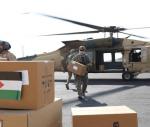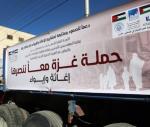You are here
Legislation should be created before proceeding with Mafraq airport
May 05,2018 - Last updated at May 05,2018
Initially, it should be acknowledged that the establishment of a military-commercial airport and a logistic centre in Mafraq is a step that, we hope, would boost the economy on the one hand, and provide the Treasury with revenues on the other. The Jordan Armed Forces-Arab Army (JAF) signed an initial partnership agreement with the US Safe Ports Company in November 2017 to establish a military-commercial airport and logistic centre in Mafraq. Another agreement was signed between the King Hussein Bin Talal Development Zone and Mafraq Governorate with the same US company. The aim of the first agreement is to establish a commercial logistic airport that operates in parallel with the current logistical land port, besides providing logistical facilities at King Hussein Air College in Mafraq. In contrast, the second agreement focused mainly on marketing part of the Mafraq development area to be a logistic centre for the reconstruction of Iraq and Syria.
The main objective of establishing an airport in Mafraq is to make Jordan the main logistic centre for the reconstruction of Iraq and Syria, to enhance the role of Jordanian exports, whose volume declined in the past years because of regional instability, and to attract international freight forwarders to the region, which means being able to receive giant commercial aircrafts.
This strategic airport will be designed to enable foreign companies to safely ship and distribute goods and equipment to the region for the reconstruction of hospitals, schools, infrastructure, manufacturing and other important needs in neighbouring countries.
The importance of focusing on the establishment of an airport in Mafraq is based on the initial partnership agreement between JAF and the Safe Ports Company. Therefore, legislation should be created for this airport in the short-run to regulate its activities and to impose Jordan's sovereignty, so that we do not find ourselves in front of an international military base or under foreign supervision and management, where this leads to the removal of Jordan’s supervision, management of the movement of aircrafts and logistics and control over security and military issues.
Thus, it is unreasonable to establish this airport without Jordan imposing restrictions and limitations prior to the establishment of the airport and before these agreements become final, putting Jordan in front of obligations that contradict its sovereignty and political, economic and military
directions.
On the other hand, since the main objective of the establishment of this airport is to make Jordan the main logistic centre for the reconstruction of Iraq and Syria, and since discharging, loading and transporting among other matters will be done within Jordan’s borders until reaching neighbouring countries through the border crossings, Jordan should have control over the content of such goods from the time they arrive to the airport in Mafraq and until their delivery to Jordan’s border crossings to prevent an illegal entry of dangerous goods and materials into the Kingdom.
The Jordanian legal system is based on international agreements and domestic legislation, it reflects Jordan's role in the international arena and it is a strategic partner that promotes progress at all political, economic and military fronts. This role should be preserved through the creation of legislation that protects and regulates the work of Mafraq airport to prevent imbalances and breaches that affect the stability and sovereignty of our country.
The writer is professor of Maritime Commercial Law at the University of Jordan. He contributed the article to The Jordan Times. [email protected]













